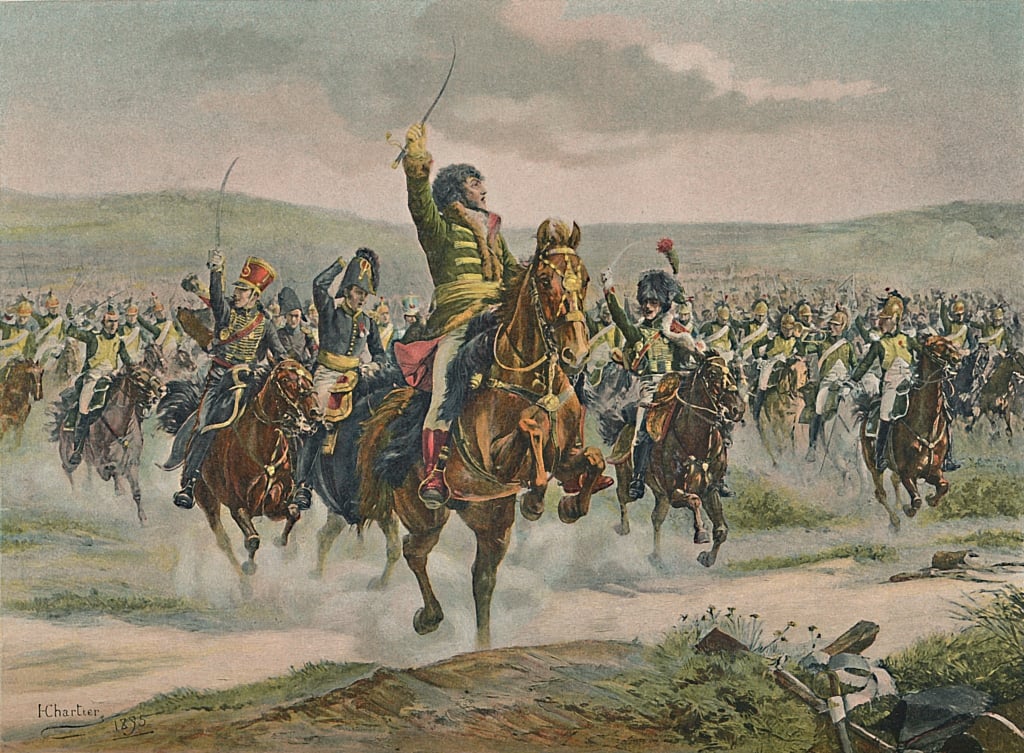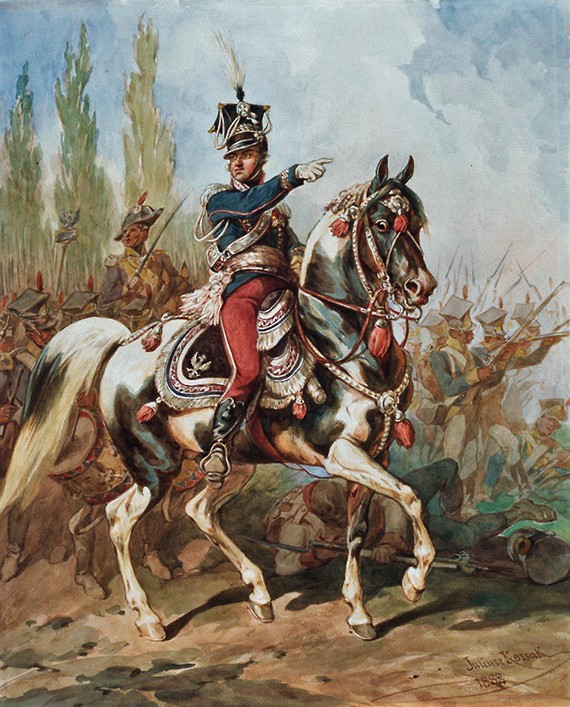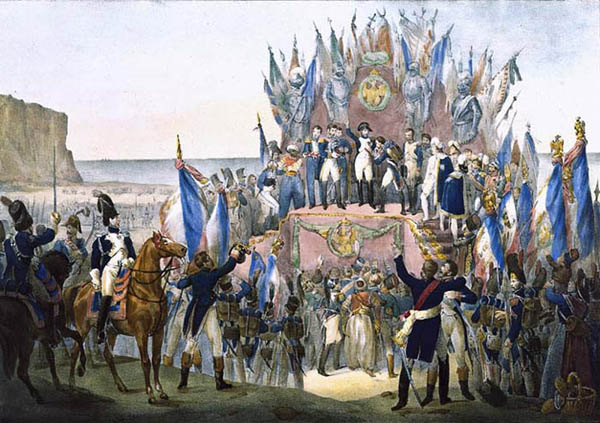|
Wincenty Aksamitowski
Wincenty Aksamitowski (September 15, 1760 – January 13, 1828) was a Polish artillery officer who rose to the rank of General, serving with the Polish army and French army during the Napoleonic Wars. He was born in Nagórzany near Kamieniec Podolski, Poland, and died in Warsaw. In 1802 as commander of the 2nd Polish Legion, he was involved in uncovering an anti-French Masonic plot which had been instigated by the Neapolitan brigade commander H. M. Aurora. Although this damaged his reputation in the eyes of his men, it did facilitate the transfer of his unit to the French armies payroll. However this came with a price: they were transferred to Haiti. Aksamitowski however did not accompany them. He was appointed Chief of Brigade in 1803, and Brigadier General in 1806. He was given command of the artillery of the Grand Duchy of Warsaw in 1806. In 1808, he was appointed a staff officer in the Grande Armée in the 3rd Corps of Louis-Nicolas Davout, and then commanded a bri ... [...More Info...] [...Related Items...] OR: [Wikipedia] [Google] [Baidu] |
Polish People
Poles,, ; singular masculine: ''Polak'', singular feminine: ''Polka'' or Polish people, are a West Slavic nation and ethnic group, who share a common history, culture, the Polish language and are identified with the country of Poland in Central Europe. The preamble to the Constitution of the Republic of Poland defines the Polish nation as comprising all the citizens of Poland, regardless of heritage or ethnicity. The majority of Poles adhere to Roman Catholicism. The population of self-declared Poles in Poland is estimated at 37,394,000 out of an overall population of 38,512,000 (based on the 2011 census), of whom 36,522,000 declared Polish alone. A wide-ranging Polish diaspora (the '' Polonia'') exists throughout Europe, the Americas, and in Australasia. Today, the largest urban concentrations of Poles are within the Warsaw and Silesian metropolitan areas. Ethnic Poles are considered to be the descendants of the ancient West Slavic Lechites and other tribes that inhabite ... [...More Info...] [...Related Items...] OR: [Wikipedia] [Google] [Baidu] |
Louis-Nicolas Davout
Louis-Nicolas d'Avout (10 May 1770 – 1 June 1823), better known as Davout, 1st Duke of Auerstaedt, 1st Prince of Eckmühl, was a French military commander and Marshal of the Empire who served during both the French Revolutionary Wars and the Napoleonic Wars. His talent for war, along with his reputation as a stern disciplinarian, earned him the nickname "The Iron Marshal" (''Le Maréchal de fer''). He is ranked along with Marshals Louis-Alexandre Berthier and Jean Lannes as one of Napoleon's finest commanders. His loyalty and obedience to Napoleon were absolute. During his lifetime, Davout's name was commonly spelled Davoust - this spelling appears on the Arc de Triomphe and in much of the correspondence between Napoleon and his generals. Biography Davout was born in the small village Annoux (Yonne) as the eldest son of Jean-François d'Avout (1739–1779), a calvalry officer and his wife (married in 1768) Françoise-Adélaïde Minard de Velars (1741–1810). He was of ... [...More Info...] [...Related Items...] OR: [Wikipedia] [Google] [Baidu] |
Polish Generals
The following is a list of Polish generals, that is the people who held the rank of general, as well as those who acted as ''de facto'' generals by commanding a division or brigade. Note that until the Partitions of Poland of late 18th century the rank of general as such was mostly (though not exclusively) reserved for commanders of artillery, while large tactical units (equivalent of divisions) were usually commanded by hetmans and voivodes. Polish–Lithuanian Commonwealth * Mikołaj Abramowicz * Krzysztof Arciszewski * Józef Bielak * Franciszek Ksawery Branicki * Alojzy Brühl * August Aleksander Czartoryski * Ignacy Działyński * Subchan Ghazi aga * Wincenty Korwin Gosiewski * Józef Judycki * Krzysztof Korycki * Tadeusz Kościuszko * Antoni Benedykt Lubomirski * Jerzy Ignacy Lubomirski * Marcin Lubomirski * Michał Lubomirski * Andrzej Mokronowski * Fryderyk Józef Moszyński * Józef Orłowski * Piotr Ożarowski * Józef Poniatowski * Kazimierz Poniatowski * St ... [...More Info...] [...Related Items...] OR: [Wikipedia] [Google] [Baidu] |
People From Podolia Voivodeship
A person ( : people) is a being that has certain capacities or attributes such as reason, morality, consciousness or self-consciousness, and being a part of a culturally established form of social relations such as kinship, ownership of property, or legal responsibility. The defining features of personhood and, consequently, what makes a person count as a person, differ widely among cultures and contexts. In addition to the question of personhood, of what makes a being count as a person to begin with, there are further questions about personal identity and self: both about what makes any particular person that particular person instead of another, and about what makes a person at one time the same person as they were or will be at another time despite any intervening changes. The plural form "people" is often used to refer to an entire nation or ethnic group (as in "a people"), and this was the original meaning of the word; it subsequently acquired its use as a plural form of per ... [...More Info...] [...Related Items...] OR: [Wikipedia] [Google] [Baidu] |
People From Khmelnytskyi Oblast
A person ( : people) is a being that has certain capacities or attributes such as reason, morality, consciousness or self-consciousness, and being a part of a culturally established form of social relations such as kinship, ownership of property, or legal responsibility. The defining features of personhood and, consequently, what makes a person count as a person, differ widely among cultures and contexts. In addition to the question of personhood, of what makes a being count as a person to begin with, there are further questions about personal identity and self: both about what makes any particular person that particular person instead of another, and about what makes a person at one time the same person as they were or will be at another time despite any intervening changes. The plural form "people" is often used to refer to an entire nation or ethnic group (as in "a people"), and this was the original meaning of the word; it subsequently acquired its use as a plural form of per ... [...More Info...] [...Related Items...] OR: [Wikipedia] [Google] [Baidu] |
1828 Deaths
Eighteen or 18 may refer to: * 18 (number), the natural number following 17 and preceding 19 * one of the years 18 BC, AD 18, 1918, 2018 Film, television and entertainment * ''18'' (film), a 1993 Taiwanese experimental film based on the short story ''God's Dice'' * ''Eighteen'' (film), a 2005 Canadian dramatic feature film * 18 (British Board of Film Classification), a film rating in the United Kingdom, also used in Ireland by the Irish Film Classification Office * 18 (''Dragon Ball''), a character in the ''Dragon Ball'' franchise * "Eighteen", a 2006 episode of the animated television series ''12 oz. Mouse'' Music Albums * ''18'' (Moby album), 2002 * ''18'' (Nana Kitade album), 2005 * '' 18...'', 2009 debut album by G.E.M. Songs * "18" (5 Seconds of Summer song), from their 2014 eponymous debut album * "18" (One Direction song), from their 2014 studio album ''Four'' * "18", by Anarbor from their 2013 studio album '' Burnout'' * "I'm Eighteen", by Alice Cooper common ... [...More Info...] [...Related Items...] OR: [Wikipedia] [Google] [Baidu] |
1760 Births
Year 176 ( CLXXVI) was a leap year starting on Sunday (link will display the full calendar) of the Julian calendar. At the time, it was known as the Year of the Consulship of Proculus and Aper (or, less frequently, year 929 ''Ab urbe condita''). The denomination 176 for this year has been used since the early medieval period, when the Anno Domini calendar era became the prevalent method in Europe for naming years. Events By place Roman Empire * November 27 – Emperor Marcus Aurelius grants his son Commodus the rank of ''Imperator'', and makes him Supreme Commander of the Roman legions. * December 23 – Marcus Aurelius and Commodus enter Rome after a campaign north of the Alps, and receive a triumph for their victories over the Germanic tribes. * The Equestrian Statue of Marcus Aurelius is made. It is now kept at Museo Capitolini in Rome (approximate date). Births * Fa Zheng, Chinese nobleman and adviser (d. 220) * Liu Bian, Chinese emperor of the Han Dynasty ( ... [...More Info...] [...Related Items...] OR: [Wikipedia] [Google] [Baidu] |
Joachim Murat
Joachim Murat ( , also , ; it, Gioacchino Murati; 25 March 1767 – 13 October 1815) was a French military commander and statesman who served during the French Revolutionary Wars and Napoleonic Wars. Under the French Empire he received the military titles of Marshal of the Empire and Admiral of France. He was the 1st Prince Murat, Grand Duke of Berg from 1806 to 1808 and King of Naples as Joachim-Napoleon ( it, Gioacchino Napoleone, links=no) from 1808 to 1815. He was the brother-in-law of Napoleon Bonaparte. Early life Murat was born on 25 March 1767 in La Bastide-Fortunière (later renamed Labastide-Murat after him), in Guyenne (the present-day French department of Lot). His father was Pierre Murat-Jordy (d. 27 July 1799), an affluent yeoman, innkeeper, postmaster and Roman Catholic churchwarden. His mother was Jeanne Loubières (1722 – 11 March 1806), the daughter of Pierre Loubières and his wife Jeanne Viellescazes. Murat's father, Pierre Murat-Jordy, was the s ... [...More Info...] [...Related Items...] OR: [Wikipedia] [Google] [Baidu] |
Army Of Germany (1809)
The Army of Germany or ''Armée d'Allemagne'' was a military formation of the First French Empire during the War of the Fifth Coalition in 1809. The Army of Germany was distinct from the ''Grande Armée'' (Great Army) of the preceding Coalition Wars, which the Emperor Napoleon I had disbanded in October 1808.John H Gill, ''The Battle of Znaim: Napoleon, The Habsburgs and the end of the War of 1809'' (Greenhill, 2020), pp. 47–. In a letter to General Louis-Alexandre Berthier dated 8 April 1809, Napoleon describes the new army's creation: "from 1 April, all the troops that I have in Germany will be known under the title ''Armée d'Allemagne'', of which I reserve to myself the command in chief." He goes on to name its officers and describe its composition.''Correspondance de Napoléon Ier'' (Paris: Imprimerie Impériale, 1865), Vol. 18no. 15029, pp. 521–524 "...''à dater du 1er avril, toutes les troupes que j'ai en Allemagne seront connues sous le titre d'Armée d'Allemagne, dont j ... [...More Info...] [...Related Items...] OR: [Wikipedia] [Google] [Baidu] |
Polish Legions (Napoleonic Period)
The Polish Legions ( pl, Legiony Polskie we Włoszech; also known as the Dąbrowski Legions) in the Napoleon I of France, Napoleonic period, were several Polish military units that served with the Grande Armée, French Army, mainly from 1797 to 1803, although some units continued to serve until 1815. After the Third Partition of Poland in 1795, many Poles believed that Revolutionary France and her allies would come to Poland's aid. France's enemies included Poland's partitioners, Prussia, Austria and Imperial Russia, Russia. Many Polish soldiers, officers, and volunteers therefore emigration, emigrated, especially to the parts of Italy under French rule or serving as client states or sister republics to France (leading to the expression, "the Polish Legions in Italy") and to France itself, where they joined forces with the local military. The number of Polish recruits soon reached many thousands. With support from Napoleon Bonaparte, Polish military units were formed, bearing ... [...More Info...] [...Related Items...] OR: [Wikipedia] [Google] [Baidu] |
Grande Armée
''La Grande Armée'' (; ) was the main military component of the French Imperial Army commanded by Emperor Napoleon Bonaparte during the Napoleonic Wars. From 1804 to 1808, it won a series of military victories that allowed the French Empire to exercise unprecedented control over most of Europe. Widely acknowledged to be one of the greatest fighting forces ever assembled in history, it suffered enormous losses during the disastrous invasion of Russia in 1812, after which it never recovered its strategic superiority. The ''Grande Armée'' was formed in 1804 from the ''L'Armée des côtes de l'Océan'' (Army of the Ocean Coasts), a force of over 100,000 men that Napoleon had assembled for the proposed invasion of Britain. Napoleon later deployed the army in eastern Europe to eliminate the combined threat of Austria and Russia, which were part of the Third Coalition assembled against France. Thereafter, the name ''Grande Armée'' was used for the principal French Army deploy ... [...More Info...] [...Related Items...] OR: [Wikipedia] [Google] [Baidu] |
General
A general officer is an Officer (armed forces), officer of highest military ranks, high rank in the army, armies, and in some nations' air forces, space forces, and marines or naval infantry. In some usages the term "general officer" refers to a rank above colonel."general, adj. and n.". OED Online. March 2021. Oxford University Press. https://www.oed.com/view/Entry/77489?rskey=dCKrg4&result=1 (accessed May 11, 2021) The term ''general'' is used in two ways: as the generic title for all grades of general officer and as a specific rank. It originates in the Tudor period, 16th century, as a shortening of ''captain general'', which rank was taken from Middle French ''capitaine général''. The adjective ''general'' had been affixed to officer designations since the late Middle Ages, late medieval period to indicate relative superiority or an extended jurisdiction. Today, the title of ''general'' is known in some countries as a four-star rank. However, different countries use di ... [...More Info...] [...Related Items...] OR: [Wikipedia] [Google] [Baidu] |


_1938.jpg)


